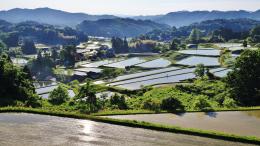On 12 December 2023 the inaugural SATOYAMA forum was held at UNU Headquarters in Tokyo, Japan to discuss the satoyama model for sustainable living and biodiversity conservation. It showcased innovative solutions stemming from collaborative efforts between Japanese universities and the AEON Environmental Foundation — a member of the International Partnership for the Satoyama Initiative (IPSI), whose secretariat is hosted by UNU-IAS.
Rina Miyake (Programme Coordinator, UNU-IAS) introduced the work of IPSI. She explained that satoyama refers to traditional Japanese landscapes where people and nature have coexisted for generations through harmonious interactions between human activities and the environment, fostering sustainable practices in agriculture, forestry and fisheries. IPSI promotes areas which balance biodiversity with the sustainable use of natural resources as socio-ecological landscapes and seascapes (SEPLS).
Opening the forum, Motoya Okada (Chairman, AEON Environmental Foundation) highlighted the foundation's conservation efforts, including the planting of over 12 million trees in the past 33 years. Takao Shiraishi (Director General, Nature Conservation Bureau, Ministry of the Environment, Japan) emphasized that the mission of the Satoyama Initiative aligns with the goals of the Kunming–Montreal Global Biodiversity Framework, a landmark agreement to safeguard and sustainably use biodiversity.
Stressing that the health of humans and the environment were interconnected, Shinobu Yume Yamaguchi (Director, UNU-IAS) expressed hope that the forum's discussions would further collaboration. Kazuhiko Takeuchi (President, Institute for Global Environmental Strategies) detailed how the integrated approach of the Satoyama Initiative was contributing to climate mitigation and adaptation, resource cycling and the achievement of the SDGs.
Two panel discussions shared insights on satoyama work in Japan, including the creation of an urban forest on the site of the former Amamiya Campus of Tohoku University. Panelists emphasized the multiple benefits of the satoyama model, including nature conservation, disaster prevention, community development, educational enrichment and fostering of innovation.
The forum was hosted by the AEON Environmental Foundation with the support of the Ministry of Environment, Japan, UNU-IAS and IPSI.



